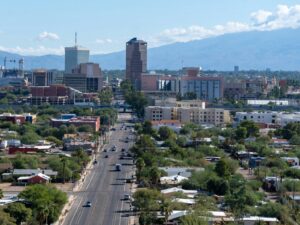Tucson, Arizona is rapidly gaining popularity not just for its scenic desert landscapes, but also for its relatively low cost of living. With remote work on the rise and families looking to escape higher-cost metros, Tucson offers a compelling financial alternative.
In recent years, Tucson has seen a steady influx of new residents—many relocating from cities like Los Angeles, San Diego, Denver, and Seattle—thanks to its affordable housing, mild winters, and low overall expenses.
Housing: Tucson’s Biggest Advantage
Median Home Price in Tucson: ~$325,000
Typical Rent (2-bedroom apartment): ~$1,450
Property Tax Rate: ~0.85% (below national average)
Compared to major cities like Los Angeles (where median home prices exceed $900,000), Tucson offers substantial value—especially for first-time buyers and retirees.
Utilities & Internet
Tucson’s utility costs are close to the national average, with electricity being a key factor due to air conditioning use during the summer. Still, average monthly bills remain lower than in Phoenix or Los Angeles.
Average Electricity Bill: $130/month
Water & Trash: ~$55/month
High-Speed Internet: $55–$80/month
Major providers include Cox, CenturyLink, and Tucson Electric Power.
Transportation Costs
Tucson is a car-friendly city with minimal traffic congestion, and fuel prices typically run lower than the national average. Other commuting options include:
– Sun Tran Bus System
– Sun Link Streetcar for downtown and university areas
– Excellent bike infrastructure
Car insurance rates are also lower in Tucson than in cities like Denver or Austin.
Groceries & Dining
Grocery prices in Tucson are slightly below the national average, and the city’s numerous farmers markets and international supermarkets make eating healthy more affordable.
Gallon of milk: ~$3.90
Dozen eggs: ~$3.25
Dinner for two at mid-range restaurant: ~$55
Tucson’s culinary scene is robust and affordable, especially considering its UNESCO City of Gastronomy status.
Health Care & Insurance
Tucson offers a strong healthcare network at a lower average cost compared to other metros. Leading providers include:
– Banner Health
– TMC HealthCare
– Northwest Medical Center
Many retirees choose Tucson because of the city’s affordable private insurance premiums and Medicare-friendly system.
Taxes in Tucson
Arizona State Income Tax: 2.5% flat tax
No tax on Social Security benefits
Sales Tax: ~8.7% (combined city/state rate)
Property Tax: Lower than national average
This tax-friendly environment makes Tucson particularly appealing for retirees and remote workers.
Is Tucson Right for Your Budget?
If you’re looking for a city with sunshine, outdoor access, rich culture, and lower bills—Tucson is a serious contender. It’s not the cheapest city in the U.S., but its value-to-lifestyle ratio is hard to beat.
Cost of Living Breakdown
Here’s a side-by-side look at Tucson’s major living expenses compared to other major cities, based on data from BestPlaces.net and Numbeo.
| Category | Tucson | Phoenix | Denver | Los Angeles | Austin |
| Housing Index | 85.2 | 110.4 | 141.6 | 298.2 | 132.6 |
| Utilities | 94.0 | 102.3 | 93.2 | 95.5 | 97.1 |
| Groceries | 96.8 | 101.1 | 98.6 | 109.2 | 99.4 |
| Transportation | 84.7 | 105.6 | 107.2 | 151.7 | 108.5 |
| Health Care | 95.5 | 96.7 | 95.2 | 90.4 | 94.6 |
| Overall Index | 89.5 | 102.2 | 112.4 | 152.3 | 109.7 |
Request your free Tucson Relocation Guide here




